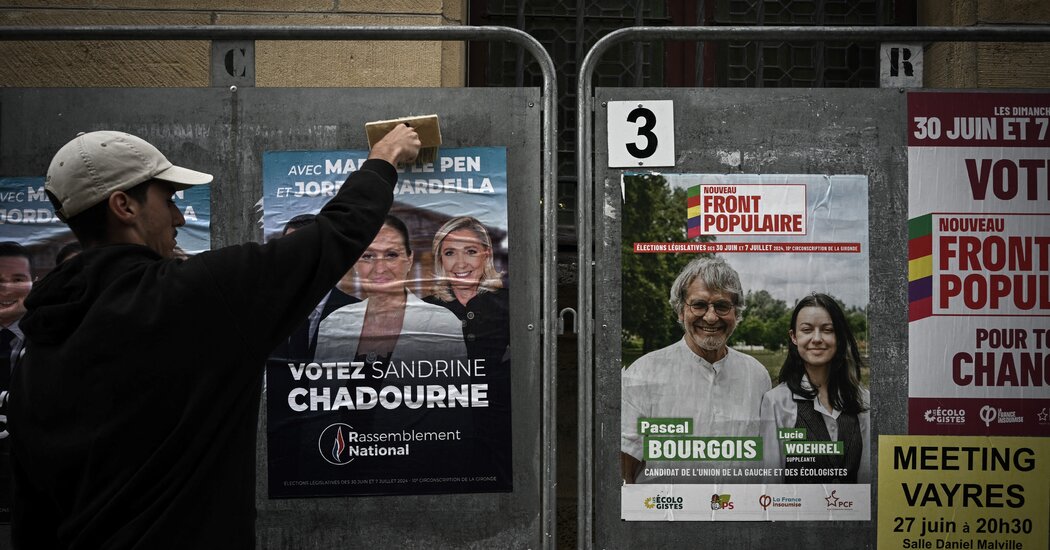Breaking News
Turnout Is High as France’s Snap Election Enters Its Final Hours

A large number of voters in France turned out to vote in the final round of snap legislative elections on Sunday. The outcome of the elections could potentially lead to President Emmanuel Macron having to work with far-right opponents, or it could result in ongoing political instability just weeks before the Paris Summer Olympics.
Midday turnout was reported to be the highest in over two decades, at around 26.6 percent, according to the Interior Ministry. This was a significant increase from the previous legislative elections in 2022, where the participation rate at the same time was less than 19 percent.
The interest in the election was evident in the slightly higher midday turnout compared to the first round of voting last week, indicating the significance of the vote in shaping the future of Macron’s second term.
Macron had called for the elections for the 577-seat National Assembly, France’s lower and more influential house of Parliament, last month in a risky move that seemed to backfire after the initial round of voting.
Most polling stations are set to close at 6 p.m. local time on Sunday, with some in larger cities closing as late as 8 p.m. Nationwide seat projections based on preliminary results are expected shortly after 8 p.m., with official results coming in throughout the night.
The key question to watch for is whether the far right will secure enough seats for an absolute majority. The first round of voting saw the National Rally party dominating, followed by the New Popular Front alliance of left-wing parties, and then Macron’s party and its allies.
With over 300 districts having three-way races and over 200 candidates withdrawing to prevent the far right from winning, it may be more challenging for the National Rally to reach an absolute majority.
Most French pollsters predict that the National Rally and its allies will secure 175 to 240 seats, falling short of the 289 seats needed for an absolute majority. However, if they do manage to secure an absolute majority, they would likely form a government, forcing Macron to collaborate with them.
How will the country’s leadership function?
A scenario where Macron remains president and Jordan Bardella of the National Rally becomes prime minister is possible, known as cohabitation in France.
In cases of cohabitation, where the president and prime minister belong to opposing parties, it can create challenges in governing as the prime minister and cabinet determine the country’s policies, while the president holds extensive executive powers.
If no bloc secures a majority, options like a caretaker government or cross-party coalition have been suggested, although they would be departures from French political tradition.
What if no one gets an absolute majority?
In the event that no bloc secures a majority, France could face months of political deadlock, as the country is not accustomed to building coalitions.
There are concerns about potential postelection protests turning violent, with security forces deployed around the country to manage any unrest.
The campaign leading up to the elections was marked by a tense atmosphere, racist incidents, and acts of violence. There are fears that the tensions could escalate into violence postelection, prompting heightened security measures.
Catherine Porter contributed reporting.
-

 Destination8 months ago
Destination8 months agoSingapore Airlines CEO set to join board of Air India, BA News, BA
-

 Breaking News10 months ago
Breaking News10 months agoCroatia to reintroduce compulsory military draft as regional tensions soar
-

 Gadgets3 months ago
Gadgets3 months agoSupernatural Season 16 Revival News, Cast, Plot and Release Date
-

 Tech News12 months ago
Tech News12 months agoBangladeshi police agents accused of selling citizens’ personal information on Telegram
-

 Productivity11 months ago
Productivity11 months agoHow Your Contact Center Can Become A Customer Engagement Center
-

 Gadgets3 weeks ago
Gadgets3 weeks agoFallout Season 2 Potential Release Date, Cast, Plot and News
-

 Breaking News10 months ago
Breaking News10 months agoBangladesh crisis: Refaat Ahmed sworn in as Bangladesh’s new chief justice
-

 Toys12 months ago
Toys12 months ago15 of the Best Trike & Tricycles Mums Recommend























